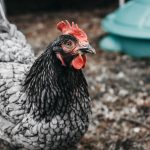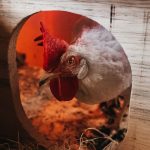Birds of prey pose a significant threat to domestic chickens, necessitating protective measures for backyard flocks. Hawks, eagles, and owls are natural predators of chickens, equipped with sharp eyesight and powerful talons that make them efficient hunters. These avian predators can spot chickens from great heights and swoop down at high speeds to capture their prey.
The danger from birds of prey is constant, as even a brief moment of exposure can result in chicken casualties. Chicken owners must be aware of this risk and implement appropriate safeguards to protect their flocks. Understanding the hunting behavior of birds of prey is crucial for developing effective protection strategies.
Proactive measures to protect chickens from aerial predators may include providing covered runs, installing reflective deterrents, or using guardian animals. By implementing such protective measures, chicken owners can significantly reduce the risk of attacks and ensure the safety of their backyard flocks.
Table of Contents
- 1 Creating a secure environment: Tips for building a predator-proof chicken coop
- 2 Deterrents and scare tactics: Using visual and auditory methods to keep birds of prey at bay
- 3 Utilizing natural barriers: Planting trees and shrubs to provide cover for chickens
- 4 Training and supervision: Teaching chickens to be wary of birds of prey and monitoring their behavior
- 5 Collaborating with nature: Attracting natural predators of birds of prey to the area
- 6 Seeking professional help: When to call in a wildlife management expert for assistance
- 7 FAQs
- 7.1 What are birds of prey?
- 7.2 Why do birds of prey pose a threat to chickens?
- 7.3 What are some common birds of prey that may target chickens?
- 7.4 How can I keep birds of prey away from my chickens?
- 7.5 Are there any legal methods to deter birds of prey from chickens?
- 7.6 What should I do if I spot a bird of prey near my chicken coop?
Key Takeaways
- Protecting chickens from birds of prey is crucial for their safety and well-being
- Building a predator-proof chicken coop is essential for creating a secure environment
- Visual and auditory deterrents can help keep birds of prey away from chickens
- Planting trees and shrubs can provide natural cover for chickens to hide from predators
- Training chickens to be wary of birds of prey and monitoring their behavior is important for their safety
Creating a secure environment: Tips for building a predator-proof chicken coop
Choose the Right Materials
When constructing a chicken coop, it is essential to use sturdy materials that can withstand the attacks of birds of prey. Hardware cloth or welded wire are excellent options, as they are much more durable than traditional chicken wire. These materials can help prevent birds of prey from gaining access to the chickens.
Design for Security
The design of the coop is also crucial in keeping birds of prey at bay. A solid roof is a must to prevent birds of prey from swooping down and capturing chickens from above. Additionally, all openings should be securely covered with wire mesh to prevent birds of prey from entering the coop.
Strategic Placement
The placement of the coop is also vital in protecting chickens from birds of prey. Ideally, the coop should be located in an open area with good visibility, making it more difficult for birds of prey to approach undetected. By considering these factors, chicken owners can create a secure environment for their flock and help protect them from birds of prey.
Deterrents and scare tactics: Using visual and auditory methods to keep birds of prey at bay

In addition to building a secure coop, there are several deterrents and scare tactics that can be used to keep birds of prey at bay. Visual deterrents such as reflective tape or shiny objects can be effective at deterring birds of prey by creating a visual disturbance that makes it difficult for them to approach the coop. Auditory deterrents such as wind chimes or predator calls can also be effective at scaring off birds of prey by creating unfamiliar and threatening sounds.
Another effective scare tactic is the use of scarecrows or predator decoys. These visual deterrents can create the illusion of a larger predator in the area, which can help deter birds of prey from approaching the coop. It is important to regularly move these deterrents around the coop to prevent birds of prey from becoming accustomed to them.
By using a combination of visual and auditory deterrents, chicken owners can help keep birds of prey at bay and protect their flock from potential harm.
Utilizing natural barriers: Planting trees and shrubs to provide cover for chickens
Planting trees and shrubs around the chicken coop can provide natural cover for chickens and help protect them from birds of prey. Trees and shrubs can provide valuable protection by creating visual barriers that make it more difficult for birds of prey to spot and capture chickens. In addition, these natural barriers can provide shelter for chickens to seek refuge if they sense danger from above.
When selecting trees and shrubs for planting, it is important to choose varieties that are dense and provide good coverage. Evergreen trees such as pine or cedar can be particularly effective at providing year-round cover for chickens. It is also important to consider the placement of trees and shrubs to ensure they provide maximum coverage around the coop.
By utilizing natural barriers, chicken owners can help create a safer environment for their flock and reduce the risk of predation by birds of prey.
Training and supervision: Teaching chickens to be wary of birds of prey and monitoring their behavior
Training chickens to be wary of birds of prey and monitoring their behavior is an important aspect of protecting them from potential harm. Chickens can be taught to be more cautious by providing them with safe areas to retreat to when they sense danger, such as dense shrubbery or covered areas within the coop. By providing these safe spaces, chickens can learn to seek refuge when they sense a threat from above.
In addition to training, it is important for chicken owners to regularly monitor their flock’s behavior for signs of distress or unease. Chickens may exhibit certain behaviors such as vocalizing loudly or seeking cover when they sense a predator nearby. By paying attention to these cues, chicken owners can take proactive measures to protect their flock from potential harm.
By providing training and supervision, chicken owners can help ensure the safety and well-being of their flock in the face of potential threats from birds of prey.
Collaborating with nature: Attracting natural predators of birds of prey to the area

Creating a Natural Deterrent
One effective way to help protect chickens from birds of prey is by attracting natural predators of these birds to the area. Animals such as larger raptors or predatory mammals can help keep birds of prey at bay by creating a natural deterrent in the area. By providing suitable habitat and food sources for these natural predators, chicken owners can encourage them to take up residence nearby and help protect their flock.
Providing Suitable Habitat
One way to attract natural predators is by providing suitable habitat such as tall trees or perches for raptors to roost in. This can be an effective way to encourage these birds to take up residence in the area and help protect the chicken flock.
Food Sources for Predatory Mammals
In addition, providing food sources such as small rodents or insects can help attract predatory mammals that may help keep birds of prey away from the area. By providing a steady food supply, chicken owners can encourage these mammals to stay in the area and help protect their flock.
A Balanced Ecosystem
By collaborating with nature and attracting natural predators, chicken owners can create a more balanced ecosystem that helps protect their flock from potential harm. This approach can be a effective and sustainable way to keep birds of prey at bay and ensure the safety of the chicken flock.
Seeking professional help: When to call in a wildlife management expert for assistance
In some cases, dealing with birds of prey may require the expertise of a wildlife management expert. If chicken owners are facing persistent predation by birds of prey despite their best efforts, it may be necessary to seek professional help in addressing the issue. Wildlife management experts have the knowledge and experience to assess the situation and provide effective solutions for protecting chickens from birds of prey.
A wildlife management expert can provide valuable insight into the behavior and habits of local bird populations, as well as offer guidance on effective deterrents and protective measures. In some cases, they may also be able to implement more advanced techniques such as trapping and relocating problem birds or installing specialized deterrent systems. By seeking professional help when needed, chicken owners can ensure that they are taking the most effective measures to protect their flock from potential harm posed by birds of prey.
In conclusion, protecting chickens from birds of prey is an important aspect of responsible chicken ownership. By understanding the threat that birds of prey pose and taking proactive measures such as building secure coops, using deterrents and scare tactics, utilizing natural barriers, providing training and supervision, collaborating with nature, and seeking professional help when needed, chicken owners can help ensure the safety and well-being of their flock in the face of potential predation by birds of prey. With careful planning and proactive measures, it is possible to create a secure environment that allows chickens to thrive while minimizing the risk posed by natural predators.
If you’re looking for more tips on keeping your chickens safe from predators, check out this article on The Chicken Coop Country Diner. It offers valuable insights on how to design a secure and predator-proof chicken coop to keep your flock safe from birds of prey.
FAQs
What are birds of prey?
Birds of prey, also known as raptors, are carnivorous birds that hunt and feed on other animals. They have keen eyesight, powerful talons, and sharp beaks, which make them efficient hunters.
Why do birds of prey pose a threat to chickens?
Birds of prey pose a threat to chickens because they see them as potential prey. Chickens are easy targets for birds of prey due to their size and inability to defend themselves effectively.
What are some common birds of prey that may target chickens?
Common birds of prey that may target chickens include hawks, eagles, owls, and falcons. These birds have a strong hunting instinct and may view chickens as a source of food.
How can I keep birds of prey away from my chickens?
There are several methods to keep birds of prey away from chickens, including using visual deterrents such as scarecrows or reflective tape, providing overhead cover for the chickens, and using noise deterrents such as wind chimes or predator calls.
Are there any legal methods to deter birds of prey from chickens?
In many places, it is illegal to harm or kill birds of prey, as they are protected under wildlife conservation laws. Therefore, it is important to use non-lethal methods to deter birds of prey from chickens.
What should I do if I spot a bird of prey near my chicken coop?
If you spot a bird of prey near your chicken coop, it is important to take immediate action to protect your chickens. You can use noise deterrents or scare tactics to drive the bird away, and consider implementing long-term deterrent measures to prevent future encounters.
Meet Walter, the feathered-friend fanatic of Florida! Nestled in the sunshine state, Walter struts through life with his feathered companions, clucking his way to happiness. With a coop that’s fancier than a five-star hotel, he’s the Don Juan of the chicken world. When he’s not teaching his hens to do the cha-cha, you’ll find him in a heated debate with his prized rooster, Sir Clucks-a-Lot. Walter’s poultry passion is no yolk; he’s the sunny-side-up guy you never knew you needed in your flock of friends!







